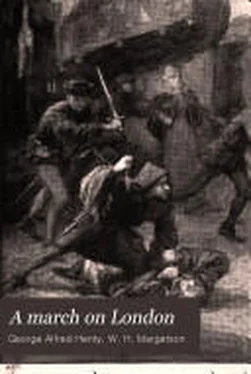Such incursions had been carried far up the Thames and great damage done, but as the ships of Fowey and other places were equally busy damaging French commerce and ravaging their sea-coast, no complaints could be made to France even during the very brief period when there was a truce between the two countries. Not only from across the Channel did these marauders come, but from the islands of Friesland and Zeeland, where the inhabitants—hardy sailors to a man—were lawless and uncontrolled. After having suffered several times from these pirates, and been moved by the constant complaints of their tenants, Edgar and Albert went up to town and laid the matter before the king and council, pointing out that these attacks were becoming more frequent and general all along the coast, and praying that measures might be adopted for putting a stop to them.
“But what do you propose should be done, sir knights?” the king asked.
“I would suggest, your Majesty, that either a few fast ships should be placed at various points, such as the mouth of the Medway, Harwich, Dover, Hastings, and Southampton, that might keep a watch for these pirates, or else that some of your vassals round the coast should be appointed to keep forces of some strength always under arms, just as the Percys are at all times in readiness to repel the incursions of the Scots; but should you and the council think this too weighty a plan, we would pray you to order better protection for the Thames. It was but the other day some pirates burnt six ships in Dartford Creek, and if they carry on these ravages unpunished, they may grow bolder and will be sailing higher still, and may cause an enormous loss to your merchants by setting fire to the vessels at the wharves, or to those anchored out in the stream.”
“The matter would be serious, assuredly,” the king said, “and would cause so great a trouble to the citizens of London that it would be well that some means should be taken to prevent it. I will talk the matter over with the council, sir knights, and will let you know in an hour's time whether we can do aught in the matter.”
When the young knights returned, the king said:
“There is a royal manor at Bromley at present vacant; 'tis of the value of fifty-six pounds a year. This we will hand over to you jointly, upon your undertaking to keep thirty men-at-arms fully equipped and ready for service, each of you; and also that each of you shall maintain, at the spots which may seem to you the most advisable, a galley with oars, in which you can put out and attack these pirates.”
Edgar begged permission to consult with his friend.
“You see, Albert, we have already each of us ten men-at-arms, and the revenue of the manor should well-nigh, if not quite, pay the expenses of the others. As to the galleys, we could keep them in the little creek between Cliffe and Graves-end. It would give us employment, and should we ever be called upon to take the field, the sixty men-at-arms will make a good beginning for the force we should gather.”
Albert assented, and, returning, they informed the council that they were ready to undertake the charge of keeping thirty men-at-arms each, always in readiness for service, and for fighting the pirates by land or water. Returning home, preparations were speedily made, and the men enrolled and drilled. A watch-tower was raised on an eminence that was visible from both castles, and a look-out place also erected at the mouth of the Medway. This was some sixty feet high. A great cresset was placed at the summit ready for firing, and an arrangement made with the tenants, on whose land it stood, that a man should be on watch night and day. His duty would be to keep a vigilant eye on the river, and to light the beacon if any suspicions vessels were seen coming up. The smoke by day or the fire at night could be seen at both castles, and by a pre-arranged system signals could then be exchanged between Edgar and Albert by means of the watch-tower on the hill.
Albert had two large and fast galleys constructed, for his wife's dowry enabled him to spend money more freely than Edgar. They had a good many encounters with the freebooters. Two or three times strong parties that had landed from ships were attacked by the garrisons of both castles, joined by the tenantry near, and were driven to the boats with heavy loss.
Once the beacon from the mouth of the Medway signalled that three ships had entered the mouth of that river. Edgar signalled to Cliffe, and when at ten o'clock the French landed just below Hoo, thinking to make an easy capture of the village, and, perhaps, even to carry the castle by surprise, they were allowed to ascend the hill undisturbed, and were then attacked by the sixty men-at-arms, led by the two knights, together with a number of villagers and countrymen armed with bows and bills. Although superior in numbers the French were driven down the hill with great slaughter. Only a few succeeded in regaining their ships; but the tide had not yet turned, and there was little wind. Boats were obtained at Upnor, the vessels boarded, and all on board put to the sword.
Three or four sharp engagements also took place between the galleys and the pirates ascending the Thames, and at various times rich prizes that the pirates had taken higher up the river were recovered from them; so that in time the depredations greatly abated, and the city of London presented the two knights with costly swords and a vote of thanks for the great services they had rendered to the city, and to those trading with it.
They were both too happy in their homes to care to go often to Court, but they viewed with pain the increasing unpopularity of the king, brought about by his reckless extravagance, his life of pleasure, and the manner in which he allowed himself to be dominated by unworthy favourites. Van Voorden, who had permanently settled in England, often came down with his wife and daughter to stay for a few days with them, and declared that he had never laid out money so well as that which had established two such happy households. The last few years of Mr. Ormskirk's life were spent at Hoo, where he still dabbled a little in his former occupation, but never succeeded in finding the elixir he had laboured so long to discover. On the departure of the Flemish steward, Hal Carter was appointed to the post, with the understanding that if his lord should ever ride to battle, he was to revert to the command of the men-at-arms. Hal was ignorant of figures, but he had a young assistant given him to manage this part of the work, and his honesty, his acquaintance with farming, and his devotion to his master, made up for any deficiency on that score. Both knights sent contingents under their sons to fight at Agincourt, and were only prevented from taking the field themselves by the entreaties of their wives and daughters, and by the thought that it would be as well to give their sons the opportunity of distinguishing themselves, as they themselves had done, in their early youth.
THE END.












